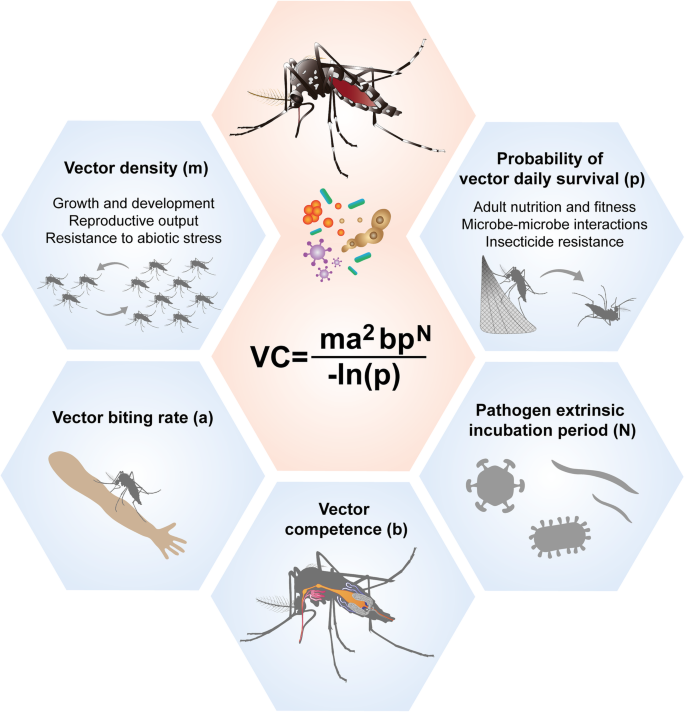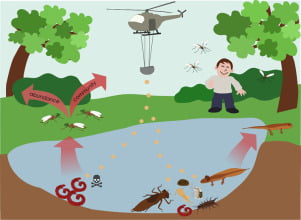Mosquitoes can spread diseases like Zika, West Nile, and malaria, leading to severe health complications and even death. Their bites can transmit viruses and parasites, causing illnesses such as encephalitis and meningitis, posing a significant threat to human health.
Additionally, the potential extinction of mosquitoes could disrupt ecosystems, affecting animals that rely on them as a food source. It is crucial to understand the negative effects of mosquitoes and take preventive measures to mitigate the risks they pose to public health and the environment.
Protecting oneself from mosquito-borne diseases is essential to prevent the spread of infections and maintain a healthy ecosystem.

Credit: microbiomejournal.biomedcentral.com
Introduction To Mosquito Threats
Mosquitoes are not just irritating pests; they pose significant threats to human health and well-being. From spreading deadly diseases to causing discomfort and distress, these tiny insects have a major impact on our lives. Understanding the negative effects of mosquitoes is crucial for implementing effective prevention and control measures.
Common Species And Their Habitats
Mosquitoes are widespread and can be found in various environments, including urban areas, forests, and wetlands. Some common species include Anopheles, Aedes, and Culex, each with specific habitats and behaviors. Anopheles mosquitoes, for example, thrive in areas with stagnant water, making them carriers of malaria, while Aedes mosquitoes prefer urban settings and are known for transmitting diseases like dengue and Zika.
Brief History Of Mosquitoes And Human Health
Mosquitoes have been a threat to human health for centuries. The ancient Greeks and Romans were well aware of the dangers posed by these insects. However, it wasn’t until the late 19th century that the link between mosquitoes and diseases like malaria and yellow fever was conclusively established. Since then, ongoing research has revealed the extent of mosquito-borne threats, leading to the development of preventive measures and medical interventions.
Direct Health Risks From Mosquitoes
Mosquitoes pose significant direct health risks to humans through their ability to transmit various diseases. Understanding the virus transmission mechanisms and the potential illnesses associated with mosquito bites is crucial for effective prevention and mitigation efforts.
Virus Transmission Mechanisms
Mosquitoes transmit diseases through the exchange of pathogens during blood feeding. When an infected mosquito bites a human, it introduces the virus or parasite into the bloodstream, leading to potential infection.
Examples Of Mosquito-borne Diseases
Mosquito-borne diseases encompass a range of serious illnesses, including:
- Malaria
- Dengue fever
- Zika virus
- West Nile virus
- Chikungunya virus
These diseases can have debilitating and even life-threatening effects on individuals, making mosquito control and prevention crucial for public health.
Indirect Impact Of Mosquitoes On Public Health
Mosquitoes pose a significant threat to public health by spreading diseases like Zika, West Nile virus, dengue, and malaria through their bites. These diseases can lead to severe health complications and even death, making mosquito control crucial for protecting communities from the negative impact of these disease-carrying insects.
Strain On Healthcare Systems
Mosquito-borne diseases not only inflict direct harm but also exert a significant strain on healthcare systems. The burden of treating individuals afflicted by illnesses such as malaria, dengue, Zika, and West Nile virus can overwhelm medical facilities, leading to a shortage of resources and personnel. This strain on the healthcare system can impede the delivery of care for other conditions and reduce the overall quality of healthcare services in affected regions.
Economic Costs Of Mosquito-borne Diseases
The economic impact of mosquito-borne diseases is substantial, encompassing healthcare expenditures, loss of productivity due to illness, and expenses related to mosquito control measures. The financial burden extends to individuals, communities, and governments, hindering economic development and perpetuating cycles of poverty in affected areas. Moreover, tourism and trade may suffer due to concerns about disease transmission, further exacerbating the economic costs associated with mosquito-borne illnesses.

Credit: www.sciencedirect.com
Psychological Effects Of Mosquito Infestations
Mosquito infestations can lead to a range of negative psychological effects, including heightened anxiety and stress due to the constant threat of mosquito-borne diseases. The fear of contracting illnesses such as Zika virus, West Nile virus, and malaria can significantly impact mental well-being.
Anxiety And Reduced Quality Of Life
Mosquito infestations can cause a great deal of anxiety and stress, leading to a reduced quality of life for those affected. The constant buzzing and biting of mosquitoes can be incredibly frustrating and disruptive, making it difficult to relax or enjoy time outdoors. This can lead to feelings of helplessness and hopelessness, as well as a general sense of unease.
Impact On Community Activities
Mosquito infestations can also have a significant impact on community activities. Outdoor events such as concerts, festivals, and sporting events may need to be canceled or postponed due to concerns about mosquito-borne illnesses. This can have a negative impact on local businesses and tourism, as well as the overall sense of community and social engagement. To make matters worse, mosquito infestations can also affect day-to-day activities such as gardening, picnics, and outdoor exercise. People may be hesitant to spend time outside, limiting their exposure to fresh air and sunlight, which can have negative consequences for both physical and mental health. In conclusion, the psychological effects of mosquito infestations can be just as significant as the physical effects. It’s important to take steps to prevent mosquito bites and control mosquito populations in order to protect our overall health and well-being.
Environmental Consequences Of Mosquitoes
Mosquitoes pose a significant threat by spreading diseases like Zika, West Nile virus, dengue, and malaria through their bites. These diseases can have severe consequences, including potential fatality in severe cases. It is crucial to protect against mosquito-borne illnesses to prevent adverse health effects.
Mosquitoes are not only a nuisance to humans but also have negative environmental consequences. The following are some of the environmental impacts caused by mosquitoes.
Biodiversity Impacts
Mosquitoes can have a significant impact on biodiversity as they are a food source for many animals, including birds, fish, and bats. The decline in mosquito populations could cause a ripple effect throughout the ecosystem, leading to a decline in the population of animals that rely on them for food. On the other hand, an increase in mosquito populations could lead to an increase in predators, which could have a negative impact on other species.
Mosquito Control And Ecological Side Effects
The use of pesticides to control mosquito populations can have negative ecological effects. Pesticides can harm not only mosquitoes but also non-target species, including beneficial insects, birds, and mammals. Additionally, some mosquitoes have developed resistance to certain pesticides, making them less effective. Another method of mosquito control is the introduction of non-native predators, such as fish or dragonflies, to eat mosquito larvae. While this method can be effective, it can also have unintended consequences, such as the introduction of non-native species that may outcompete or prey on native species. Overall, the negative environmental consequences of mosquitoes highlight the need for sustainable and eco-friendly methods of mosquito control.
Global Warming And Mosquito Populations
Mosquitoes thrive in warmer climates, and the effects of global warming have led to a significant increase in their populations. The rise in temperatures has created ideal conditions for mosquito breeding, resulting in a surge of mosquito-borne diseases. Let’s delve into the negative impacts of global warming on mosquito populations.
Rising Temperatures And Mosquito Breeding
As temperatures soar due to global warming, mosquitoes find more favorable environments for breeding. The warmer climate accelerates their reproductive cycles, leading to a surge in mosquito populations. This phenomenon exacerbates the prevalence of mosquito-borne diseases, posing a severe threat to public health.
Expansion Of Mosquito-borne Diseases
The expansion of mosquito populations due to global warming has also led to the spread of mosquito-borne diseases. Diseases such as Zika virus, West Nile virus, Chikungunya virus, dengue, and malaria have seen a significant increase in prevalence. The heightened risk of these diseases has become a pressing concern, necessitating proactive measures to mitigate their impact on global health.
Protection And Prevention Strategies
Mosquitoes are not just annoying pests; they also pose serious health risks due to their ability to spread diseases. Implementing effective protection and prevention strategies is crucial in mitigating the negative effects of mosquitoes. Here are some key approaches to consider:
Personal Protection Techniques
Individuals can take proactive measures to safeguard themselves from mosquito bites. This includes:
- Using insect repellent containing DEET
- Wearing protective clothing, such as long-sleeved shirts and pants
- Installing mosquito nets over beds to prevent nighttime bites
- Eliminating standing water around the home to remove potential mosquito breeding grounds
Community-wide Mosquito Control Initiatives
Community-level efforts play a vital role in reducing mosquito populations and minimizing disease transmission. These initiatives involve:
- Fogging and spraying in public spaces to target adult mosquitoes
- Implementing larval control measures to limit mosquito breeding in water sources
- Promoting public awareness about the importance of mosquito control and personal protection
- Collaborating with local authorities to address mosquito-related issues on a broader scale
Future Challenges And Research Directions
Mosquitoes pose a significant threat to human health, as they are vectors for various deadly diseases such as Zika virus, West Nile virus, Chikungunya virus, dengue, and malaria. In addition to the current challenges, it is essential to consider the future challenges and research directions in combating the negative effects of mosquitoes.
Developments In Mosquito Control Technology
The continuous development of mosquito control technology is crucial for managing the negative effects of mosquitoes. Advancements in this field, including the use of innovative traps, genetic modification techniques, and environmentally friendly insecticides, are vital for effective mosquito population control.
Emerging Threats And Vaccine Research
As mosquitoes continue to adapt and evolve, new emerging threats are constantly being identified. Research into the development of effective vaccines against mosquito-borne diseases is imperative to mitigate the potential future impact on public health. The exploration of novel vaccine candidates and the enhancement of existing vaccines are critical areas for further investigation.
Credit: www.businessinsider.com
Frequently Asked Questions
How Are Mosquitoes Harmful To Us?
Mosquitoes spread diseases like Zika, West Nile, and malaria through infected bites, causing illness and potential death.
What Damage Does Mosquito Cause?
Mosquitoes cause harm by spreading diseases like Zika, West Nile, dengue, and malaria through their bites.
What Bad Do Mosquitoes Do?
Mosquitoes spread diseases like West Nile, dengue, and malaria through their bites, making people sick.
Conclusion
The negative effects of mosquitoes are far-reaching, from spreading diseases like Zika and malaria to causing severe illnesses. Mosquito control is crucial to prevent health risks and ensure a safer environment for everyone. Protecting against mosquito bites is essential for overall well-being and disease prevention.
Related posts:

I’m MD Tanvir, and I bring years of expertise gained from working closely with pest control companies to the forefront. My journey in the industry has inspired me to launch Bug Battler, a platform aimed at equipping people with the know-how to combat pests autonomously. Through Bug Battler, I aim to empower individuals with practical insights to tackle pest infestations effectively.

